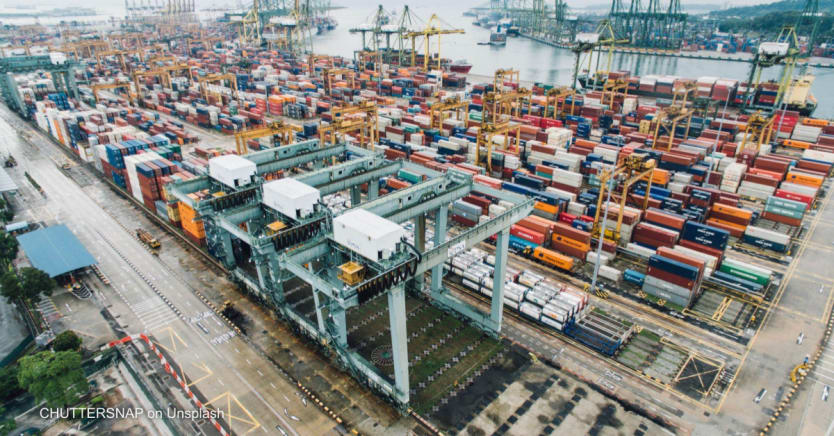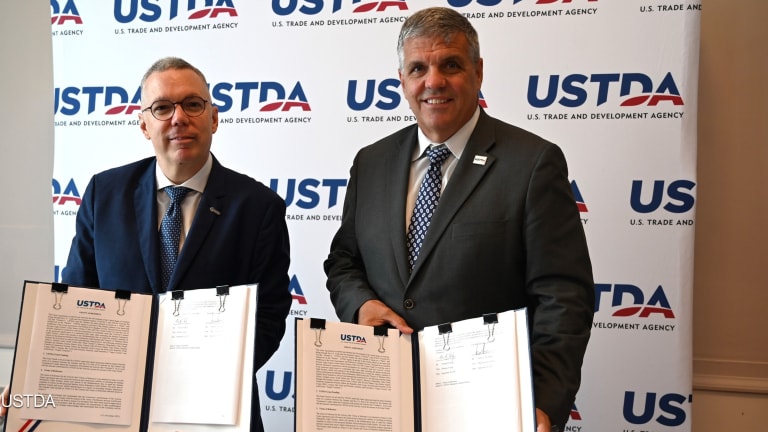Opinion: Raising the US standard in trade capacity building

The United States, as the world’s largest foreign aid donor and single-country provider of trade-related assistance, has a clear commitment to fostering international development that spans multiple administrations. This bipartisan leadership involves engagement with the U.S. private sector to leverage our nation’s value proposition as a development and humanitarian partner, and simultaneously introduce global markets to long-term trade and investment relationships.
U.S. trade and development policies therefore cannot work at cross-purposes. However, the current Policy for Trade Capacity Building, or TCBP, of the U.S. Agency for International Development fails U.S. companies and producers by inadvertently enabling foreign competition.
Trade capacity building is a critical part of the U.S. international development strategy. USAID’s TCBP guides the agency’s investments in emerging markets to establish and reinforce market opening and reform-oriented trade and enabling environment policies.
[TCBP] should champion American standards and values, while ensuring U.S. enterprises and investors have access to a level playing field.
—U.S. firms are eager to see these activities underway, including streamlining customs; reducing smuggling and trafficking; facilitating trade and implementing trade agreements; managing sanitary and phytosanitary measures; removing technical barriers; promoting intellectual-property rights; and adopting labor and the environment protections.
TCBP’s focus on assisting governments to implement their binding obligations under the World Trade Organization’s Trade Facilitation Agreement is helpful. It is similarly useful to U.S. firms when TCBP leverages the input of organizations such as the American National Standards Institute, the official U.S. representative to the International Organization for Standardization.
But the policy also directs USAID and its implementing partners to design their programs to meet a series of undefined “international standards,” which can include regulations and rules developed by America’s competitors — including those decidedly closed market and strikingly anti-reform.
The lack of emphasis on U.S. standards in the TCBP requires immediate clarification. U.S. companies often face competition not from local, in-country partners — which are paramount to sustainable and durable solutions — but rather multinational bidders.
With their efforts responding to U.S. prompts, local partners implementing a U.S. funded-program aligned to U.S. standards maintain avenues for further U.S. private sector and allied engagement, essential in transitioning an aid-based relationship to one rooted in trade and investment.
Conversely, without clear direction our own best efforts can enable multinational peers: American aid should never promote the adoption or expansion of international standards when they restrict or impede the ability of U.S. businesses to compete. By not requiring USAID to lead with U.S. standards, the current TCBP unintentionally subsidizes foreign competition and hinders U.S. competitiveness.
The People’s Republic of China’s increasing influence in multilateral institutions can make exclusively relying on unspecified standards problematic.
For example, when the TCBP gives primacy to environmental and construction standards adopted by the World Bank, from which China is both the leading borrower and recipient of contracts, USAID might inadvertently abet a competitor and undermine our core values.
A revised TCBP with transparent policy and funding guidance that clearly prioritizes adherence to democratic, free-market principles would reinforce the U.S. Standards Strategy, which fosters an open, rules-based standards system.
TCBP marks a sensible starting point for the Biden administration to put its “foreign policy for the middle class” into action. Continuing the trend of U.S. trade policy successes and commendable work from the interagency during the past administration, an update would improve TCBP’s guidance for the current U.S. Standards Strategy.
It should champion American standards and values, while ensuring U.S. enterprises and investors have access to a level playing field. Rather than encourage undefined international standards, the policy should promote U.S. leadership in sectors like agriculture, biotechnology, and energy.
Expanding sections of TCBP on expectations for good governance, transparency, accountability, compliance, and certification would better-serve U.S. stakeholders, as would preventing USAID and its implementing partners from assisting governments to adopt regulations grounded in the so-called precautionary principle.
The policy also should leverage the ANSI-USAID Standards Alliance by identifying where acceptable international cooperation commitments currently exist.
Revisions to TCBP are a necessary step, and would benefit from strong interagency cooperation. Initiatives such as Prosper Africa and the Infrastructure Transaction and Assistance Network have fostered cross-government collaboration successfully.
The TCBP should link to and reinforce sector-specific standards and regulatory information from peer departments and agencies, such as the Office of the U.S. Trade Representative, the Foreign Agricultural Service, Bureau of Industry and Security, International Trade Administration, and Customs and Border Protection, to support the U.S. Standards Strategy, and anticipate barriers and ensure consistency.
TCBP, the Millennium Challenge Corporation’s compact and threshold programs and development and implementation guidance, and the Development Finance Corporation’s Roadmap for Impact must be harmonized to avoid incoherence and confusion.
USAID earned praise from the White House in the President’s Trade Agenda and Policy Review in 2020 — the agency should use this momentum to revise the TCBP. Promoting U.S. technical, legal, and regulatory standards is good for partner countries worldwide, for U.S. national and economic security, and for American taxpayers. Foundational policies such as USAID’s TCBP can create the best possible avenues for U.S. firms and farmers to continue to set the example for global development.
Search for articles
Most Read
- 1
- 2
- 3
- 4
- 5









